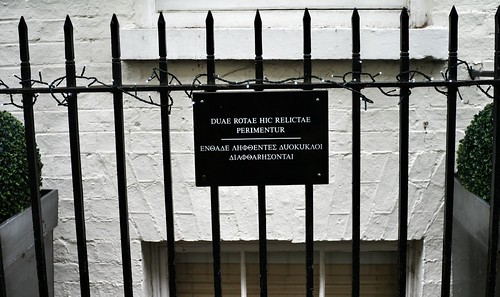The historian Keith Thomas has a terrific piece in the current edition of the London Review of Books about the government’s current onslaught on UK universities. It’s full of good stuff, as you’d expect from such a distinguished scholar.
He has three specific proposals which make a lot of sense.
1. Firstly, he thinks (rightly) that the Coalition has made a terrible job of ‘explaining’ its policy on tuition fees. What it’s created is a graduate tax — which doesn’t seem unreasonable given the lifetime benefits that a degree confers (or at any rate use to confer) upon a student. But ministers haven’t explained that to the public.
Instead, potential students have the mistaken impression that they will be crushed by a lifelong burden of intolerable debt. The other day I heard a mother on the radio lamenting that, if her son went to university, he might never get a job and would therefore be unable to repay his colossal debts. Universities should do all they can to help poor students by fee waivers, scholarships and maintenance grants, but above all they should try to dispel the fog of misunderstanding which the government’s ineptitude has created.
2. Secondly, Thomas thinks universities should press for changes to the REF (Research Excellence Framework — the bean-counting scheme proposed to assess the quality of university research). Writing about the REF’s predecessor, the Research Assessment Exercise, he says that
In my experience, this operation, though initially a stimulus, has in the longer run had appalling effects. It has generated a vast amount of premature publication and an even larger amount of unnecessary publication by those who have nothing new to say at that particular moment, but are forced to lay eggs, however addled. In the social sciences, it has discouraged the writing of books, as opposed to specialist articles, and by making peer review the ultimate arbiter it has very probably enshrined orthodoxies and acted as a curb on intellectual risk-taking and innovation. Everywhere, it has led to an unwelcome shift in academic priorities, for younger faculty have been encouraged to do all they can to secure outside research grants which will allow them to escape from teaching, which they now regard as a vastly inferior activity; and it has induced vice-chancellors to emulate football clubs by buying in outside ‘stars’ on special terms and conditions. The RAE has also been absurdly rigid in its requirements. A few years ago, a colleague in another university published a huge book, based on a vast amount of archival research, meticulously documented, beautifully written and offering a new and formidably argued reinterpretation of a major historical event. I remarked to a friend in that university that this great work would certainly help their prospects in the RAE. ‘Oh no,’ he said. ‘We can’t enter him. He needs four items and that book is all he’s got.’
Thomas would like to see the abolition of the REF altogether, but that’s unlikely to happen. Universities, he thinks, should press for a longer interval between each round of assessment, say, ten years rather than six, a much greater emphasis on the quality of publications rather than their quantity, and the relegation of ‘impact’ to an optional extra rather than an essential requirement.
Since the REF is a scheme which is workable only if academics co-operate with it, the universities could easily achieve some reform here, but only if they maintain a united front. Unfortunately, those institutions which are currently most successful in the competition have no incentive to change the system, its undesirable intellectual consequences notwithstanding.
The chances of British universities maintaining a “united front” are close to zero, given the way in which the Browne Review and the Government White Paper reconfigured the system to make them “competitors” for “customers” (i.e. the people formerly known as students).
The lack of solidarity — or even collegiality — among academics is one of the most depressing aspects of the current crisis. One sees this acutely in the way it renders universities unable to combat the racketeering of journal publishers, for example. If all the serious universities in Britain and the US collectively decided that they would cancel journal subscriptions rather than submit to the price gouging currently practiced by publishers, then the entire cartel would collapse in a year. But the moment a university librarian so much as hints that s/he is minded to call the publishers’ bluff there will be angry calls from academics each concerned not about the importance of the issue for the community, but about their individual interests — citations, access to papers, etc.
3. Thomas’s final recommendation is, in a way, the most radical. It is that
universities should collectively and publicly refute the repugnant philosophy underlying the Browne Report and the White Paper by reaffirming what they stand for and what they believe is their correct relationship to students on the one hand and to the government on the other. The original purpose of universities in the Middle Ages was to train students for service in Church and State, but the undergraduate curriculum was in the liberal arts (which, of course, included science and mathematics), and only after graduating did students take up vocational courses in law, medicine and theology. Today, universities aim to enable students to develop their capacities to the full; in the process, they acquire the mental skills and intellectual flexibility necessary to meet the demands of a rapidly changing economy. But a university should not provide vocational training, in the narrow sense of uncritical indoctrination in the rules and techniques of a particular trade. Institutions which do that are an indispensable part of the higher education system. But if their courses are vocational and their staff do not engage in research, it does not help to call them ‘universities’: that way they end up being regarded as inferior versions of the real thing. We need a diverse system of higher education, but only some of its components should be universities and much confusion is created by the indiscriminate application of that name.
The most upsetting thing about what’s happening to UK universities is the way it’s undermining what was a rather good system. University education was one of the areas where Britain punched way above its weight. But the implementation of the philistinism of a clueless engineer is now eviscerating the system as Humanities departments, for example, face extinction. That’s not to say that there weren’t things that needed to be fixed in the old system, but UK universities in the latter half of the twentieth century were pretty good. Thomas — who is one of the greatest scholars of his generation — has some mordant reflections on his own experience:
The [Oxford] college where I became a tutor in 1957 had only 19 academic fellows. Of these, two did no research at all and their teaching was languid in the extreme. That was the price the rest of us paid for our freedom and in my view it was a price worth paying. For the other fellows were exceptionally active, impelled, not by external bribes and threats, but by their own intellectual ambition and love of their subject. In due course three became fellows of the Royal Society and seven of the British Academy. They worked at their own pace and some of them would have fared badly in the RAE, for they conformed to no deadlines and released their work only when it was ready. I became a tutor at the age of 24, but I did not publish a book until I was 38. These days, I would have been compelled to drop my larger project and concentrate on an unambitious monograph, or else face ostracism and even expulsion.
Just ponder that. Of 17 active academics, three FRSs and seven FBAs.


